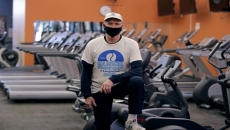Matthew Davidson was beating his heroin addiction. The 31-year-old was attending group recovery meetings. He had a restaurant job he liked. He was a doting uncle to a baby nephew.
Then the coronavirus pandemic hit. Davidson lost his job. He started staying home alone in his apartment near Georgetown, Kentucky — depressed and yearning for his recovery support group that had stopped gathering in person, said his cousin Melanie Wyatt.
On May 25, his girlfriend came home to find him dead of a drug overdose.
Davidson was part of a surge in overdose deaths that hit Kentucky this spring. May was its deadliest month for overdoses in at least five years. At the end of August, the state had seen almost as many overdose deaths as it had in all of 2019.
It is not alone. National data is incomplete, but available information suggests U.S. drug overdose deaths are on track to reach an all-time high. Addiction experts blame the pandemic, which has left people stressed and isolated, disrupted treatment and recovery programs, and contributed to an increasingly dangerous illicit drug supply.
Before the coronavirus even arrived, the U.S. was in the midst of the deadliest drug overdose epidemic in its history, with a record 71,000 overdose deaths last year.
This year's tally likely will surpass that, according to preliminary death data from nine states reviewed by The Associated Press and national data on emergency responses to reported drug overdoses.
National numbers take months to tabulate, because tests and death investigations can take time even when medical examiners offices are not stretched thin by a pandemic. Last week, the Centers for Disease Control and Prevention posted a count through March, the month when COVID-19 hospitalizations and deaths jumped in the Northeast and when stay-at-home orders and other virus measures began.
The full effect of those closures won't be seen until April and May, experts say. Still the latest numbers shows deaths trending up: Nearly 74,000 overdose deaths were counted from April 2019 to March 2020, up from the 68,000 reported for the comparable period one year earlier.
“The new CDC data confirms our fears that COVID-19 is exacerbating the already devastating overdose crisis," said Jules Netherland, who oversees research at the Drug Policy Alliance, a non-profit that focuses of illicit drug use issues.
The AP reviewed preliminary overdose death statistics from nine states with more recent counts — Colorado, Connecticut, Kentucky, Massachusetts, Missouri, New Jersey, Rhode Island, Texas and Washington. Most included data allowing comparisons to earlier years, and those numbers show overdose deaths outpacing what was reported during the same months of 2019, in some cases by substantial margins.
In Connecticut, for example, preliminary overdose death counts were up more than 19% through the end of July, compared with the same time frame last year. They were up 9% in Washington through the end of August, 28% in Colorado, and 30% in Kentucky during that same period.
Overdose deaths were trending up even before the virus emerged. So 2020 may well have been to be a bad year even without the pandemic, said Dana Quesinberry, who oversees a University of Kentucky project focused on state overdose deaths.
That said, the coronavirus played a role in worsening the overdose epidemic, though it will take years of study to sort out exactly how, she added.
Available data does suggest an acceleration since COVID-19 hit. In nearly every state reviewed by the AP, overdose death counts reached their highest numbers in April or May, and then dipped down somewhat afterward. Experts cautioned that doesn't necessarily mean the peak has passed. Numbers for more recent months will likely rise as more autopsies are finished.
There are other signs that overdoses are rising.
ODMAP, a project that tracks police and emergency calls responding to suspected overdoses from thousands of agencies in 49 states, found that 62% of counties that send data to the project saw increases after lockdowns started. By another measure, initial overdose reports rose more than 17%.
“All indicators seem to be pointing to the fact that there is more drug related activity — and, unfortunately, overdoses — nationally,” said Jeff Beeson, deputy director of a federally authorized grant program that oversees ODMAP.
Beginning in the mid-1990s, the rise of U.S. overdose deaths was driven by abuse of prescription opioid painkillers. Gradually, many people turned to cheaper street drugs such as heroin and a more lethal drug, fentanyl. In 2015, heroin began causing more deaths than prescription painkillers or other drugs. In 2016, fentanyl and its close cousins became the biggest drug killer.
There's no comprehensive data yet on which drugs were used in 2020 overdose deaths, but fentanyl and methamphetamine — often meth that is laced with fentanyl — are now the most common killers.
Dr. Mark Tyndall, a University of British Columbia medical professor who researches overdose deaths, said the pandemic interfered with heroin importation. Meanwhile, meth and fentanyl have continued to proliferate.
“On the whole, COVID had further deteriorated the illegal drug supply. Made it even deadlier,” Tyndall said. "That's one reason why things are worse. The risk of you injecting poison is higher than it was before COVID."
Then there's the impact on addiction treatment and counselling.
As stay-at-home orders and other measures were put in place, counselling sessions moved online.
“It’s not the same as being in a place with that depth of connection that we have from in-person engagement, because connectedness is one of the drivers of recovery,” said Robert Pack, of East Tennessee State University. With job losses, isolation and depression, people are "going to be challenged in every direction,” said Pack, who researches addiction issues.
That's what happened to Matthew Davidson in Kentucky.
He died of a fentanyl overdose, but Wyatt blames her cousin’s death on the pandemic.
“Had this isolation not been going on, maybe someone would have been with Matthew,” Wyatt told The Associated Press. “There’s a good chance somebody could have been there that could have saved him.”
Wyatt said her cousin last went to rehab about a year and a half ago, and it appeared to stick. He had been benefiting greatly from his group addiction recovery meetings, but those ended when the virus struck. And, online meetings were not for him.
“Being surrounded by good people, sober people, is the most important thing for a drug addict in recovery,” Wyatt said. "When that’s gone, trouble is going to happen."



